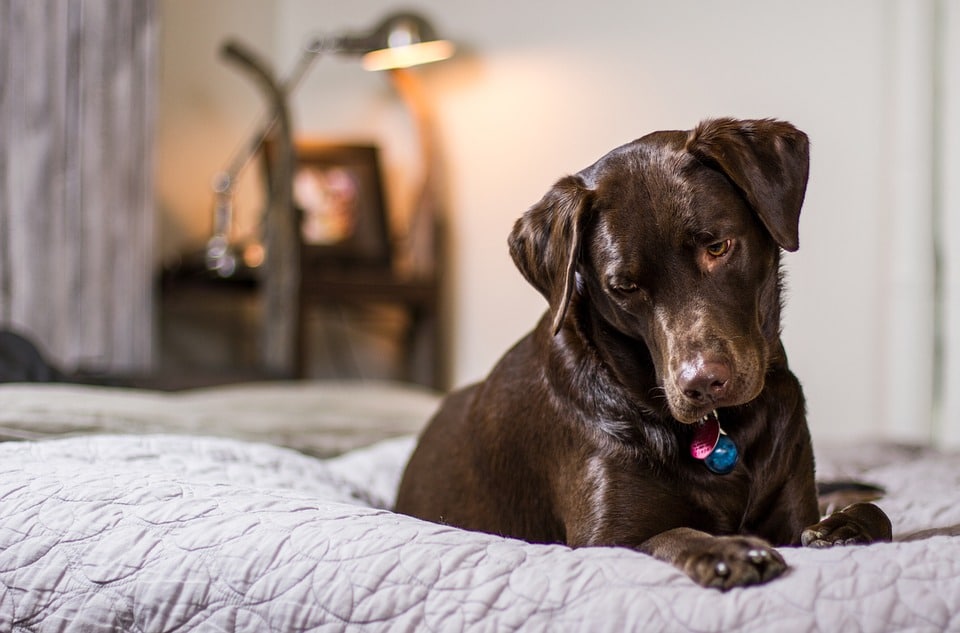Dogs may pee in your bed due to territorial marking or health issues. This behavior is often a result of stress or anxiety, and it’s essential to address the root cause to prevent further accidents.
Dogs may pee in their owner’s bed for various reasons, ranging from marking their territory to potential health issues. There are behavioral and medical factors contributing to this behavior that pet owners need to understand. Addressing stress, anxiety, or potential health concerns is crucial to preventing this behavior in the future.
We will delve into the reasons why dogs exhibit this behavior and provide insights on how to effectively address and manage it. Understanding your dog’s behavior is the first step in creating a harmonious environment for both you and your furry companion.

Credit: www.rover.com
Causes Of Inappropriate Urination
The causes of inappropriate urination, such as a dog peeing in your bed, can stem from various reasons. Understanding these causes is crucial in addressing the behavior and providing the necessary solutions to prevent it from persisting.
Territorial Instincts
Dogs are territorial animals and may mark their territory by urinating in specific areas, including the bed. This behavior is often seen in unneutered male dogs, although females can also exhibit territorial instincts. Establishing dominance and marking boundaries are among the primary motivations behind this behavior, and it is essential to address these instincts through proper training and behavioral management.
Anxiety And Stress
Anxiety and stress can trigger inappropriate urination, as dogs often resort to marking or relieving themselves in familiar environments, such as the bed, when experiencing heightened emotions. New surroundings, separation anxiety, changes in routine, and fear can all contribute to a dog’s stress levels, leading to involuntary urination. Identifying and addressing these stress triggers can help alleviate the behavior.
Medical Conditions
Underlying medical issues can also contribute to a dog’s inappropriate urination. Urinary tract infections, bladder stones, incontinence, and other health-related concerns can lead to accidents in the home, including urinating on the bed. It is crucial to promptly consult a veterinarian to rule out any potential health issues and provide appropriate medical treatment, if necessary.
Signs Of Stress In Dogs
Understanding the behaviors that indicate stress in dogs is crucial for their well-being. Dogs, like humans, experience stress, which can manifest through various signs. Recognizing these signs early can help address the underlying causes and provide your furry friend with the support they need to alleviate their stress.
Excessive Licking
One of the signs indicating stress in dogs is excessive licking. Dogs may lick their paws, legs, or other parts of their body obsessively when they feel stressed. This behavior can lead to skin irritation and other health issues. Keep an eye on your dog’s licking habits, as it could be a signal of distress.
Pacing And Panting
Another noticeable sign of stress in dogs is pacing and panting. When a dog paces back and forth or pants excessively, it could be a clear indicator of their discomfort. Pacing and panting can occur when a dog is anxious, fearful, or stressed. Pay attention to these behaviors, especially in unfamiliar or tense situations.
Changes In Appetite
Stressed dogs may exhibit changes in their appetite. This can manifest as a sudden decrease or increase in food intake. Some dogs may eat less or refuse to eat altogether, while others may seek comfort in excessive eating. Monitoring your dog’s eating habits and addressing any sudden changes can help identify and alleviate their stress.
Behavioral Training Techniques
Dogs peeing in your bed can be a frustrating behavior. However, with the right behavioral training techniques, it’s possible to address this issue effectively. By utilizing positive reinforcement, consistency in routine, and redirecting behavior, you can effectively train your dog to avoid peeing in your bed.
Positive Reinforcement
Positive reinforcement involves rewarding your dog for desirable behavior. When your dog pees outside or in the designated bathroom area instead of your bed, be sure to praise and reward them. This will help them understand that peeing in the appropriate spot is a positive and rewarding behavior.
Consistency In Routine
Establishing a consistent routine is crucial for training your dog. Take your dog outside at regular intervals to allow them to relieve themselves in the appropriate area. By providing consistent opportunities to pee outside, your dog will become accustomed to this routine and be less likely to pee in your bed.
Redirecting Behavior
When you notice your dog showing signs of wanting to pee in your bed, it’s important to immediately redirect their behavior. Take them outside or guide them to the designated bathroom area. By interrupting the undesirable behavior and redirecting them to the appropriate spot, you can effectively discourage peeing in your bed.
Creating A Comfortable Environment
Creating a Comfortable Environment is crucial for preventing your dog from peeing in your bed. By understanding your dog’s needs and providing a serene and secure space, you can minimize the likelihood of this behavior. Below are some key factors to consider when creating a comfortable environment:
Adequate Exercise
Dogs need regular exercise to maintain their physical and mental well-being. Inadequate exercise can lead to anxiety and restlessness, which may result in inappropriate urination, including on your bed. Ensure your dog receives daily walks and engaging playtime to expend excess energy.
Calming Aids
Introducing calming aids, such as comforting scents or soothing music, can help alleviate anxiety in your dog, reducing the likelihood of them urinating in your bed. Consider using lavender essential oil or a pet-friendly calming diffuser to create a relaxing ambiance in the bedroom.
Establishing Boundaries
Establishing clear boundaries can help create a sense of security for your dog. Use gates or crates to designate your dog’s sleeping area, and make sure it is equipped with a comfy bed and favorite toys. This will create a space that your dog associates with relaxation and security, reducing the likelihood of urinating in your bed.
Seeking Professional Help
Seeking professional help is essential when your dog is consistently peeing in your bed. While some cases may be due to behavioral issues, others may indicate underlying health problems. It’s important to consult with experts to identify the root cause and find an appropriate solution to this issue.
Consultation With A Veterinarian
If your dog is routinely urinating on your bed, it’s crucial to schedule a visit to a reputable veterinarian. A thorough physical examination and diagnostic tests will help rule out any medical conditions that could be causing this behavior. Addressing any potential health issues is vital in understanding and resolving the problem.
Behavioral Specialist Referrals
If the veterinarian confirms that your dog’s behavior is not medically related, seeking the assistance of a certified animal behaviorist or a dog trainer specialized in behavioral issues can provide valuable insight. Professional behaviorists can delve into the underlying causes of your dog’s urination tendencies and develop a customized plan to address and modify this behavior.
Frequently Asked Questions On Why Does A Dog Pee In Your Bed
Why Do Dogs Pee In The Bed?
Dogs may pee in the bed due to various reasons such as anxiety, medical issues, or lack of proper training. It’s essential to identify the underlying cause and address it with positive reinforcement training and regular bathroom breaks.
How To Prevent A Dog From Peeing In The Bed?
Prevent dogs from peeing in the bed by establishing a regular bathroom schedule, providing enough exercise, and addressing any potential anxiety or medical issues. Additionally, using crate training and positive reinforcement can help in preventing this behavior.
What Are The Medical Reasons For A Dog Peeing In The Bed?
Medical reasons for a dog peeing in the bed can include urinary tract infections, bladder stones, diabetes, or incontinence. Consulting a veterinarian can help in identifying any medical issues and providing the necessary treatment for your dog’s health.
Can Anxiety Cause A Dog To Pee In The Bed?
Yes, anxiety can cause a dog to pee in the bed. Separation anxiety or changes in the household can lead to stress, resulting in inappropriate elimination. Addressing the root cause of anxiety through behavior modification and positive reinforcement techniques can help in managing this issue.
Conclusion
In short, dogs may pee in your bed due to various reasons like anxiety, medical issues, or lack of proper training. Understanding the underlying cause and addressing it can help prevent this behavior. Consistent training, regular vet check-ups, and creating a secure environment can all contribute to resolving this issue.
Remember, patience and understanding are key in addressing your furry friend’s behavior.



